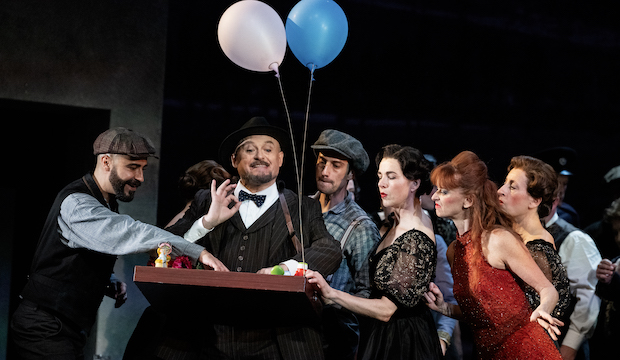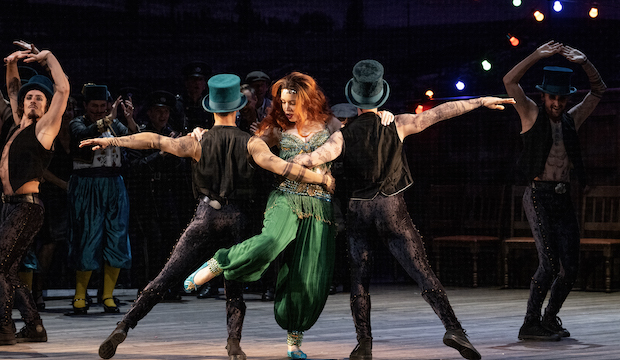La Forza del Destino, Royal Opera House review ★★★★★
It's messy play time at Covent Garden in a madcap revival of Verdi's action-packed opera
Brian Jagde as Don Alvaro in La Forza del Destino at Covent Garden. Photo: Camilla Greenwell
Christof Loy’s production of La Forza del Destino at the Royal Opera House is a mess – but then, so is Verdi’s opera.
Alvaro, son of a Spanish nobleman, is eloping with Leonora when his pistol goes off, accidentally killing her father. Her brother Carlo swears to avenge the family, and spends the next 10 years searching for the pair. Leonora, believing Alvaro has fled the country, seeks refuge in a hermit’s cave, with the permission of the Father Superior of a nearby monastery.
Coincidentally, both Carlo and Alvaro volunteer to fight in Italy against the German army and Carlo saves Alvaro’s life. But when Carlo discovers Alvaro’s true identity, he challenges him to a duel and they have to be forcibly prevented from killing each other. Alvaro returns to Spain and becomes a monk at the monastery near Leonora’s cave. Carlo tracks them down with fatal consequences....
The opera has been referred to as The Force of Coincidence, rather thanThe Force of Destiny, but the sprawling plot of the original Spanish play by the Duke of Rivas was exactly what tempted Verdi back to composition after two years of semi-retirement following his previous opera, Un Ballo in Maschera. He was particularly attracted to the crowd scenes which gave him the opportunity to portray, in contrast to the grandees and their intractable codes of honour, ordinary people simply trying to survive – soldiers, gypsy fortune-tellers, wandering salesmen, peasants and prostitutes.

Verdi's La Forza del Destino becomes confusingly crowded. Photo: Camilla Greenwell
These crowd scenes suffer particularly badly in Loy’s production: modern opera directors tend to marshall choruses into regimented choreographed groups rather than as individuals. Hence, 'Rataplan', the big number for the fortune-teller Preziosilla (a rather lightweight Vasilisa Berzhanskaya), becomes a Broadway number, complete with unison hand-jiving and Bob Fosse waistcoats and top hats. Quite fun but light relief only, far from achieving Verdi’s ambition of convincingly portraying all human life.
Loy approaches this vast array of material, not by simplifying the action, but by adding even more information. The curtain rises at the start of the overture, revealing three small children playing in a dining-room, imitating religious statues, when one suddenly dies (or is killed by the infant Leonora?). Loy tells us that this is Leonora’s youngest brother who died at an early age (which would have been news to Verdi). The point seems to be that the damage Leonora and her brother suffered from this trauma is played out in their adult actions: The Force of Psychology perhaps.

Dance moves echo Bob Fosse. Photo: Camilla Greenwell
Loy locates the final scene of the deaths of Leonora and her brother back in their childhood dining-room – an interesting and poignant idea if we had not already spent most of the evening in this same dining-room, albeit with one wall retracted to reveal a large crucifix in an alcove, representing the monastery (the rather dreary sets designed by Christian Schmidt).
So if Verdi’s opera is a misunderstood mess, what remains? Well, vocal music like molten lava for one thing – fascinating, inexorable, mysterious. Conductor Mark Elder leads a thrilling account which meant that, musically at least, there wasn’t a dull moment in a performance that lasted almost four hours.
Brian Jagde as Alvaro produces a heroic tenor sound which Sondra Radvanovsky, the New York Met’s resident diva, matches decibel for decibel, effortlessly filling the theatre with her dramatic soprano (although dangerously over-using her chest voice). Etienne Dupuis sings elegantly as Carlo and somehow manages to make the character sympathetic. You could have heard a pin drop during his slow aria in Act 3. Rodion Pogossov sings the monk Melitone with a hint of steel in his voice and one of the great pleasures of the evening is the velvety bass of Evgeny Stavinsky as the Father Superior.
La Forza del Destino is sung in Italian with English surtitles. Further performances are on 24, 27 Sept; 2, 6, 9 Oct. Click here to book
Alvaro, son of a Spanish nobleman, is eloping with Leonora when his pistol goes off, accidentally killing her father. Her brother Carlo swears to avenge the family, and spends the next 10 years searching for the pair. Leonora, believing Alvaro has fled the country, seeks refuge in a hermit’s cave, with the permission of the Father Superior of a nearby monastery.
Coincidentally, both Carlo and Alvaro volunteer to fight in Italy against the German army and Carlo saves Alvaro’s life. But when Carlo discovers Alvaro’s true identity, he challenges him to a duel and they have to be forcibly prevented from killing each other. Alvaro returns to Spain and becomes a monk at the monastery near Leonora’s cave. Carlo tracks them down with fatal consequences....
The opera has been referred to as The Force of Coincidence, rather thanThe Force of Destiny, but the sprawling plot of the original Spanish play by the Duke of Rivas was exactly what tempted Verdi back to composition after two years of semi-retirement following his previous opera, Un Ballo in Maschera. He was particularly attracted to the crowd scenes which gave him the opportunity to portray, in contrast to the grandees and their intractable codes of honour, ordinary people simply trying to survive – soldiers, gypsy fortune-tellers, wandering salesmen, peasants and prostitutes.

Verdi's La Forza del Destino becomes confusingly crowded. Photo: Camilla Greenwell
These crowd scenes suffer particularly badly in Loy’s production: modern opera directors tend to marshall choruses into regimented choreographed groups rather than as individuals. Hence, 'Rataplan', the big number for the fortune-teller Preziosilla (a rather lightweight Vasilisa Berzhanskaya), becomes a Broadway number, complete with unison hand-jiving and Bob Fosse waistcoats and top hats. Quite fun but light relief only, far from achieving Verdi’s ambition of convincingly portraying all human life.
Loy approaches this vast array of material, not by simplifying the action, but by adding even more information. The curtain rises at the start of the overture, revealing three small children playing in a dining-room, imitating religious statues, when one suddenly dies (or is killed by the infant Leonora?). Loy tells us that this is Leonora’s youngest brother who died at an early age (which would have been news to Verdi). The point seems to be that the damage Leonora and her brother suffered from this trauma is played out in their adult actions: The Force of Psychology perhaps.

Dance moves echo Bob Fosse. Photo: Camilla Greenwell
Loy locates the final scene of the deaths of Leonora and her brother back in their childhood dining-room – an interesting and poignant idea if we had not already spent most of the evening in this same dining-room, albeit with one wall retracted to reveal a large crucifix in an alcove, representing the monastery (the rather dreary sets designed by Christian Schmidt).
So if Verdi’s opera is a misunderstood mess, what remains? Well, vocal music like molten lava for one thing – fascinating, inexorable, mysterious. Conductor Mark Elder leads a thrilling account which meant that, musically at least, there wasn’t a dull moment in a performance that lasted almost four hours.
Brian Jagde as Alvaro produces a heroic tenor sound which Sondra Radvanovsky, the New York Met’s resident diva, matches decibel for decibel, effortlessly filling the theatre with her dramatic soprano (although dangerously over-using her chest voice). Etienne Dupuis sings elegantly as Carlo and somehow manages to make the character sympathetic. You could have heard a pin drop during his slow aria in Act 3. Rodion Pogossov sings the monk Melitone with a hint of steel in his voice and one of the great pleasures of the evening is the velvety bass of Evgeny Stavinsky as the Father Superior.
La Forza del Destino is sung in Italian with English surtitles. Further performances are on 24, 27 Sept; 2, 6, 9 Oct. Click here to book
TRY CULTURE WHISPER
Receive free tickets & insider tips to unlock the best of London — direct to your inbox
| What | La Forza del Destino, Royal Opera House review |
| Where | Royal Opera House, Bow Street, Covent Garden, London, WC2E 9DD | MAP |
| Nearest tube | Covent Garden (underground) |
| When |
19 Sep 23 – 09 Oct 23, Six performances; start times vary. Running time 3hr 55min, including two intervals |
| Price | £13-£245 |
| Website | Click here for details and booking |